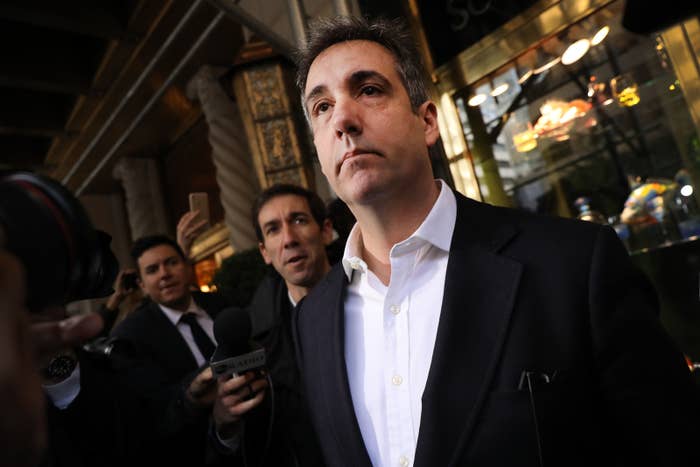
WASHINGTON — Newly unsealed court records show special counsel Robert Mueller knew by the end of 2017 that President Donald Trump had been writing checks that year to his former lawyer Michael Cohen totaling more than $280,000 — months before FBI agents raided Cohen’s home and offices in April 2018.
A federal judge in Washington, DC, unsealed five search warrant applications on Wednesday that Mueller’s office filed in 2017 seeking access to email accounts tied to Cohen (see below). The documents shed light on just how much information Mueller had gathered on Cohen by the end of that year. The special counsel’s office didn’t pursue charges against Cohen related to his finances, however; they referred out that investigation to federal prosecutors in Manhattan.
What isn’t clear is whether Mueller knew why Trump was writing checks to Cohen when his office listed the payments in two November 2017 applications. News reports, court records, and statements from Cohen and Trump’s own legal team would later confirm that the president reimbursed Cohen for a payment he arranged in the months before the 2016 election to stop adult film star Stormy Daniels from going public with claims that she had an affair with Trump. Cohen pleaded guilty last year to campaign finance violations in connection with that payment as well as hush money paid to former Playboy Playmate Karen McDougal.
When FBI agents executed search warrants on Cohen’s home and office in April 2018, the public learned for the first time that Mueller’s office had referred information about Cohen to federal prosecutors in New York to pursue. At the time, it wasn’t known what exactly the special counsel’s office gave the Manhattan prosecutors, or when. Based on the documents unsealed Wednesday, Mueller’s office had evidence of the Trump payments before making the referral to their New York counterparts.
The 2017 search warrant applications — which US District Chief Judge Beryl Howell agreed to unseal after a group of news outlets petitioned the court — show the special counsel’s office was exploring hundreds of thousands of dollars Cohen received from domestic and foreign corporate entities, and whether he’d been acting illegally as a foreign agent and working with companies trying to lobby the Trump administration. A search warrant application filed by Mueller’s office in July 2017 and two applications filed in August 2017 didn’t mention the Trump checks.
In the November 2017 applications, the government told the judge that they’d obtained records from an unnamed bank that showed an account was opened under Cohen’s wife’s name around March 2017. Records from that financial institution and a second unnamed bank showed Cohen had received at least seven checks from Trump totaling $280,000 since February. Cohen endorsed the checks over to his wife, who deposited them in the account in her name, according to the FBI agent who signed the affidavit.
The applications don’t include any other information about the payments. Representatives of the special counsel's office and the US attorney's office in New York did not immediately return requests for comment.
Some information about what Mueller’s office was investigating in 2017 related to Cohen was disclosed earlier this year when a judge unsealed search warrant applications filed by prosecutors in New York in 2018. The documents unsealed Wednesday offered more details about what Mueller’s office was investigating and what they’d found in 2017.
The 2017 applications also detailed payments Cohen received throughout the year from foreign or foreign-tied entities, including Columbus Nova LLC, an investment management firm that Mueller's office said was under a holding company in Switzerland controlled by a wealthy Russian national with reported ties to Russian President Vladimir Putin, Viktor Vekselberg. The documents also listed payments Cohen received from a bank in Kazakhstan, a Korean aerospace company, telecommunications giant AT&T, and a subsidiary of pharmaceutical company Novartis International AG.
Columbus Nova said in a statement that Vekselberg was not involved in making decisions about or providing payments to Cohen. Columbus Nova is an American entity, and the Renova Group — the entity that Mueller said was based in Switzerland and controlled by Vekselberg — is its largest client, the company said.
Although Mueller’s office had been investigating whether Cohen unlawfully acted as an unregistered agent for a foreign entity, he was never charged with violating the Foreign Agents Registration Act. He reached a deal with prosecutors in New York in August 2018, pleading guilty to the campaign finance violations related to the hush money payments, as well as tax evasion and making false statements to a bank.
Cohen alleged Trump directed him to make the payments to Daniels and McDougal in order to influence the election, which turned the hush money payments into campaign contributions subject to federal contribution limits. Trump was not charged — the Justice Department has long held that a sitting president cannot be prosecuted — and he has denied that he broke the law.
In November 2018, Cohen pleaded guilty in a separate case brought by Mueller’s office that accused him of lying to Congress about the timeline of efforts to build a Trump Tower in Moscow in 2016. Cohen had told congressional committees that the Moscow deal ended in January 2016, when in fact it was still being discussed within the Trump Organization in June of that year.
Cohen began serving a 3½-year sentence in a federal prison in New York earlier this month.
UPDATE
Updated with additional information bout Columbus Nova and a statement from the company.
Read the 2017 search warrants:
July 18, 2017: https://assets.documentcloud.org/documents/6022465/7-18-17-Cohen-Search-Warrant.pdf
Aug. 1, 2017: https://assets.documentcloud.org/documents/6022466/8-1-17-Cohen-Search-Warrant.pdf
Aug. 7, 2017: https://assets.documentcloud.org/documents/6022467/8-7-17-Cohen-Search-Warrant.pdf
Nov. 14, 2017 (I): https://assets.documentcloud.org/documents/6022469/11-14-17-Cohen-Search-Warrant.pdf
Nov. 14, 2017 (II): https://assets.documentcloud.org/documents/6022468/11-14-17-Cohen-Search-Warrant-II.pdf

